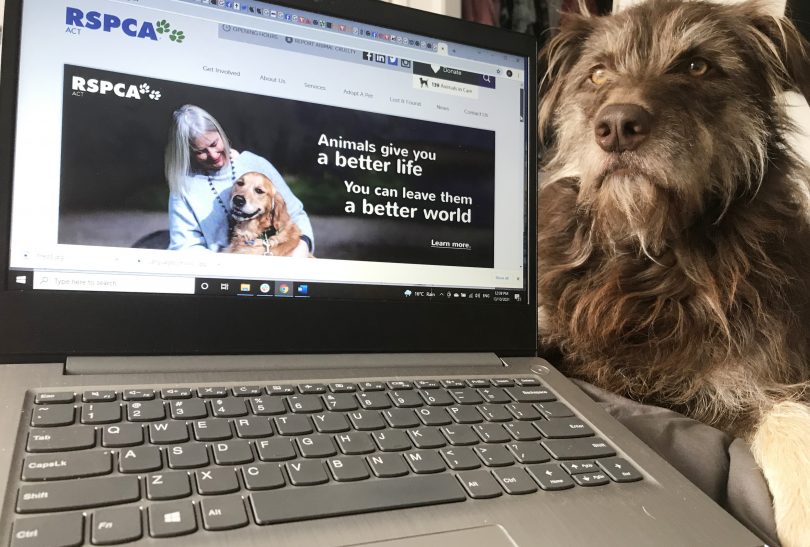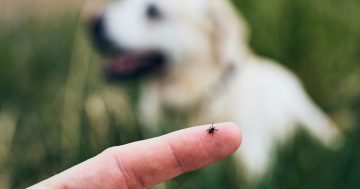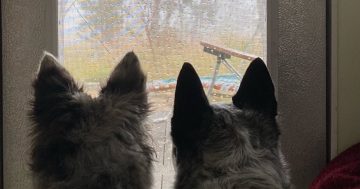
Is your pet ready for you to return to the office? Photo: Katrina Condie.
With COVID-19 restrictions now easing in NSW, we’re all looking forward to heading back to work, school and dinner dates with friends, but some family members might not be so happy that lockdown is over.
Families are being urged to prepare their pampered pets for the changes ahead to avoid fretting and separation anxiety.
RSPCA ACT CEO Michelle Robertson says dogs, cats and even birds have enjoyed more time at home with their families, often eating, sleeping and playing together 24 hours a day, seven days a week during lockdown.
But she warns the shock of owners returning to work and school could have a massive emotional impact on our furry and feathered friends.
Separation anxiety and boredom could see pets tearing up furniture, eating pot plants, forgetting their toilet training and dogs barking excessively when they’re left at home alone.
Michelle says the key to preventing this negative behaviour is to “make a plan now”.
“We all know things are changing so let’s look at the things you need to do to keep your animal occupied when you’re not there,” she says.
“It’s important to start building up now and getting pets ready for when we return to work.”
Owners should start leaving their pets at home for short periods to get them used to being alone. Michelle suggests using creative ways to keep them entertained, such as kongs filled with treats, snuffle mats or leaving the radio on.
“Look for things to keep your animal’s mind occupied while you’re out of the house,” she says.

Fred, now called Mr Business, was adopted during the COVID-19 lockdown and is making the most of time at home with his new family. Photo: RSPCA ACT.
“It’s also a good idea to make them physically tired by going for a long walk with your dog, or playing with your cat’s favourite toy before work.
“This will give them that physical exhaustion so they can chill for the rest of the day.”
Now is also the time to consider looking for dog walkers in your neighbourhood, doggy day care options, or play dates with family and friends.
Planning ahead and preparing animals will reduce the risk of negative behaviour, which could lead to them being surrendered by frustrated owners.
“We don’t want to see animals back in the shelter because they have been naughty, or picked up bad habits due to loneliness or anxiety,” says Michelle.
She says avoiding ‘rituals’ such as picking up your keys and handbag, or making a big fuss when leaving or arriving can also reduce stress on pets, including dogs, cats and birds.
“It’s a good idea to randomly pick up your keys and rattle them so pets don’t associate the sound with you leaving, and so they don’t anticipate something negative happening,” says Michelle.
“Making a big deal out of leaving or arriving home can exacerbate separation anxiety.”
RSPCA ACT experienced a surge in adoptions during the COVID-19 lockdown, with more than 120 applications received in the first four days after opening their phone lines.
“It’s been incredible,” says Michelle.
“We did no adoptions for the first week because we needed to change our processes so we were able to adopt in a safe way over the phone and using Zoom.
“When we opened, we were completely smashed with applications and, in the first month, we adopted 100 animals out, which is crazy.”
Working from home and kids’ home-schooling means pets are less prone to bad behaviour, escaping and wandering the streets, and as a result, Michelle says there have been less animals surrendered to the RSPCA.
For the first time in three years, only three dogs and three birds were available for adoption, compared to a normal week which can see up to 200 pets seeking homes.
But the COVID-19 adoption surge has not compromised RSPCA’s rigorous checks and matchmaking processes to ensure animals get into the right homes.
Michelle says lockdown has provided an opportunity for families and individuals to form special bonds with their new or existing pets.
Working or studying with pets can make us more productive and reduce stress.
“As we return to normal life, this may be an opportunity, as a society, for pets to come into the office more which would benefit animals and workers,” says Michelle.
People who are worried about their pet should talk to their vet, a trainer, or find advice on dog training websites.
“You can solve any problem with love, patience and dedication, but you need to invest in it,” says Michelle.
If people want to rehome their dogs, they are advised not to use social media, but to surrender to a rescue organisation such as the RSPCA.
For more tips and to see the latest pets available for adoption, visit RSPCA ACT.
Original Article published by Katrina Condie on The RiotACT.
















